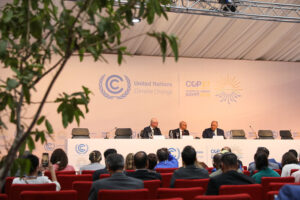
With the first ever Health Day due to take place at COP28 on 3rd December, including the adoption of a Ministerial Declaration on Climate and Health, the global climate and health community is also calling for ambitious decision-making and action across negotiations to protect and promote health. The protection of human health necessitates accelerated progress across all dimensions of UNFCCC policymaking, and with coordination and action across sectors.
Climate change has profound direct and indirect impacts on health and wellbeing, driving injury and deaths from heatwaves and other extreme weather events, wildfires, vector-borne and water-borne disease transmission, food and water insecurity, poor non-communicable disease outcomes, adverse maternal-child health outcomes and threats to sexual health and reproductive rights, and negative mental health impacts. Ecosystem degradation is also associated with zoonotic disease transmission and risk of pandemics. The burden falls most heavily on vulnerable populations with the least capacity to address them. Meanwhile, action to address climate change delivers health gains and opportunities through clean air, nutritious diets, physical activity, safe water, and healthy living environments.
In order to avoid further costly health losses and damages, adaptation and mitigation must be viewed hand in hand, supported by necessary finance. Without urgent mitigation, the limits of adaptation, which is already vital in many settings, will rapidly be exceeded, with catastrophic impacts for physical and mental health. Health systems are challenged to deliver universal health coverage even at current levels of warming.
In order to protect and promote health, action on climate and health must include and extend far beyond healthcare systems – the majority of health and climate determinants lie outside the healthcare sector itself. Health outcomes of climate action across sectors should be considered and evaluated alongside economic priorities.
The priorities can be viewed here.
Spanish version here.
If you would like to discuss these recommendations, please email [email protected]

